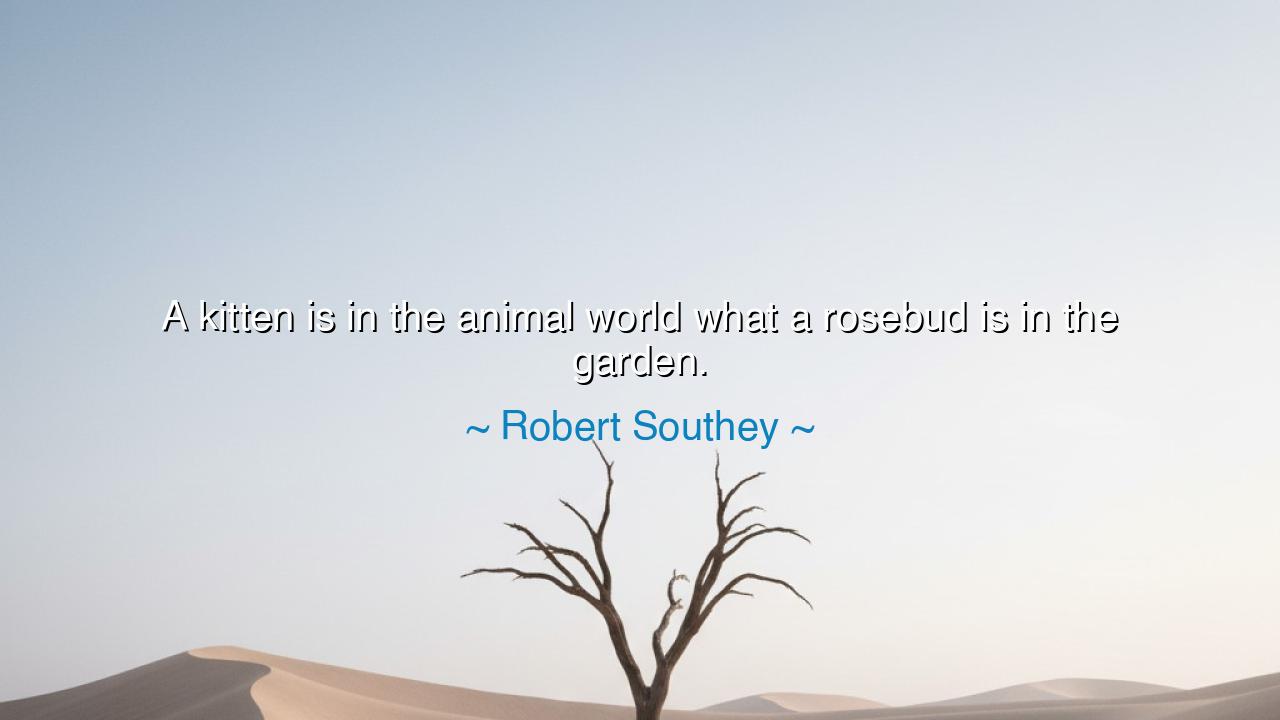
A kitten is in the animal world what a rosebud is in the garden.






Hearken to the gentle words of Robert Southey: “A kitten is in the animal world what a rosebud is in the garden.” With this likeness, the poet binds together two images of innocence and promise—the soft, playful beginnings of life embodied in the kitten, and the tightly folded beauty of the rosebud, not yet open but already perfect in its design. The quote is no idle ornament of speech; it is a meditation on the early stages of life, where purity and potential dwell together, and where the smallest of beings reflect the eternal rhythm of creation.
The ancients revered symbols such as these. To them, the rosebud was not only a flower but a sign of purity, of beauty in the making, of destiny yet to unfold. Likewise, a kitten, with its wide eyes and unsteady paws, carries within itself both fragility and promise. It is a spark of joy that foretells the full grace of the cat to come. Southey, wise in his imagery, shows us that beginnings are sacred, and that to behold them with wonder is to recognize the fingerprints of the divine upon all things.
Consider, if you will, the tale of St. Francis of Assisi, who saw in every creature a reflection of God’s artistry. Once, he was said to have spoken tenderly to a small lamb, treating it with the same reverence as a child. To Francis, the creatures of the earth, no matter how small, bore within them a beauty that could teach the hardened human heart to soften. A kitten, like a rosebud, is not yet in its full glory, but it reveals through its innocence a glimpse of heaven’s design. It is this truth that Southey captures—that even in the earliest bloom of life, there is completeness worthy of awe.
Yet the teaching goes deeper. For both the kitten and the rosebud remind us of transience. The rosebud will open, blossom, and fade. The kitten will grow, mature, and one day pass from our sight. Their beauty is fleeting, and therein lies the poignancy of Southey’s image. The wisdom of the ancients tells us: do not wait to cherish beauty, for the bud does not linger forever. To miss the joy of a kitten’s play or the fragrance of a half-open rose is to turn away from the gifts of the present moment.
But the kitten also embodies vitality, playfulness, and the courage of beginnings. It leaps, tumbles, and discovers the world with reckless innocence, just as the rosebud strains toward the sun. This is the lesson for mankind: we too must learn to embrace the new, to cherish our own beginnings, however small or fragile they may seem. For within each of us lies the rosebud stage of some hidden dream, some growing purpose, waiting to unfold into its fullness.
What then shall we take from this? First, that we must learn to honor the beauty of beginnings, whether in the lives of creatures, in the unfolding of nature, or in the tender sprouts of our own endeavors. Second, we must recognize that fragility does not diminish worth; rather, it heightens it. To cradle a kitten gently, to protect a rosebud from the storm, is to participate in the sacred duty of stewardship. Such acts of care root us in humility and gratitude.
Finally, let this teaching be sealed in your heart: “A kitten is in the animal world what a rosebud is in the garden.” To see this truth is to walk with reverence through life. Be tender with the young and the fragile. Be patient with what has not yet bloomed. And when you encounter beauty in its earliest form, pause and cherish it, for it will never appear the same way again. As the rosebud opens to the rose and the kitten grows to the cat, so too does every life blossom toward its destiny. Let us, then, meet these beginnings with wonder, care, and gratitude, for in them lies the whisper of eternity.






AAdministratorAdministrator
Welcome, honored guests. Please leave a comment, we will respond soon